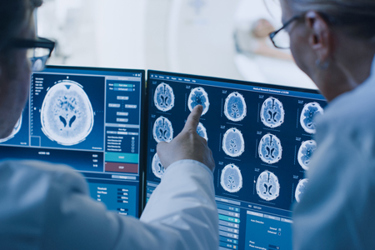AI Technologies Drive Drug Development And Enhance Patient Experience In Neurology & Rare Diseases
By Colin Lake, Head of Digital Care Transformation, Neurology and Rare Diseases, UCB

Having witnessed the need for greater technologies and the importance of data sharing in response to the COVID-19 pandemic, UCB understands that digital healthcare and AI technologies play a crucial role in exploring and treating a range of rare diseases as we welcome a new era of personalized care and potentially better patient outcomes.
You only have to look at the COVID Moonshot initiative, a Microsoft-driven plan that UCB contributed to, to help drive innovation in clinical development. By combining UCB’s AI algorithms with Microsoft’s significant technology impact, teams were able to research potential treatments for COVID-19 at an accelerated speed. Thanks to AI, vital research that informs clinical strategy and would typically take six months to conduct was completed within just three days.
But AI and supporting technology’s potential isn’t limited to drug development; it can enhance clinical trials by leveraging vast and complex data pools to improve patient recruitment, data collection, and adherence monitoring, as well as accelerate the research process and reduce costs. AI algorithms, combined with an effective digital infrastructure, can also enable the continuous stream of clinical trial data to be cleaned, aggregated, coded, stored, and managed.
However, these technologies aim to assist researchers and doctors rather than replace them. They’re intended to help researchers and HCPs make informed decisions and treatment suggestions in potentially strained healthcare systems, enabling them to approach patient care more strategically with the time saved. Here’s how.
AI Across The Drug Development Life Cycle
AI is helping to revolutionize drug development, clinical trials, and healthcare by enabling more precise diagnoses, patterns, and trend detection — all potentially contributing to disease prevention. Specifically, AI can analyze vast datasets, assisting in early diagnosis, risk prediction, and treatment recommendations, which collectively enhance the overall quality of care provided. For instance, AI algorithms can analyze a patient's medical history, genetic information, and real-time health data to create personalized treatment plans that consider individual factors and preferences. AI can also predict disease progression and potential health risks for each patient based on their unique data, enabling early intervention and preventive measures.
Understanding all this, UCB is exploring multiple diverse AI avenues. In drug development, UCB is currently working with Iktos, a Paris-based AI company focused on deep-learning-based drug design, to accelerate drug discovery in neurology and immunology. Within trend detection, we are collaborating with Accenture to speed up data processing of patient safety reports. On the route to the future of clinical trials, UCB works with the EFFIRIS consortium to predict the safety profile of medicines including cardiac safety before they are tested in human trials. Taking it a step further, UCB’s endorsement of the “My RLS Monitor,” which remotely supports restless leg syndrome patients, has helped those affected document and review their well-being before consultations. Pairing these tools with AI helps assist in early diagnosis, risk prediction, and suitable treatment recommendations.
Remote Monitoring Helps Patients, Propels Research
Digital healthcare solutions, such as remote monitoring, bridge gaps in patient engagement within neurology, especially for clinical care. Many patients are now able to access personalized resources via patient online portals and wearable devices, which also conduct remote monitoring.
For those living with neurological conditions, monitoring is essential. Digital healthcare solutions equipped with AI can remotely track patient vital signs and symptoms, which are shared with the patient as well as with their medical professional and caregivers. This adaptive approach to trials, designed to allow modifications and post-trial initiation, without compromising validity and integrity, enables researchers to intervene promptly to enhance the overall patient experience. UCB currently sponsors over 100 clinical studies in which this adaptive trial approach keeps patients’ needs front and center.
In addition to patient benefits, remote monitoring also enables better trial data. A key area where UCB deploys remote monitoring data is within the Myasthenia Gravis (MG) clinical program, where UCB works with technology companies such as Huma to make greater use of data in a disease area that, because of its rare nature, has made data collection a challenge. Now, rather than simply using this data to monitor disease progression and quality of life, UCB can now ask the “So what?” questions. This is where AI is pushing the boundaries of statistical analysis, with the potential to aid in predicting future events and act quickly to improve outcomes.
Establishing Trust To Become Truly Patient-Centric
It is important to note the successful integration of digital remote monitoring and AI tools across the healthcare spectrum relies heavily on a foundation of trust — trust from the public, medical professionals, and caregivers. UCB knows that it is their role as experts in neurology to be transparent and continuously work to build that trust with these groups. UCB also offers educational resources, medication reminders, and a support network in tandem, these innovations empower patients to actively manage their conditions.
This approach also has a positive impact on clinical trial participation — the data collected during the trial is likely to be more reliable and representative of real-world scenarios, which can lead to more accurate and meaningful results for patients, benefiting the success of the trial and the possible development of new treatments. These holistic approaches contribute to better adherence to treatment plans and overall well-being.
Sometimes, the patient-centric thing to do is to remove patients from the situation — while still keeping them front-and-center — with the use of digital twins, a virtual model used to accurately reflect a physical object such as the human brain. The use of this modeling technology could allow us to identify patterns of symptomatic behavior such as seizures, and in principle allow medical professionals to design more personalized plans based on simulated behavior to predict how a specific patient might react to treatment, without requiring any physical experience from the patient. Although the concept of digital twins has existed for over a decade, it has only recently been introduced into the healthcare space. Today, UCB and Aitia’s strategic collaboration highlights the value behind identifying patterns of symptomatic behavior. The partnership combines the use of novel disease drug targets, from Aitia's Gemini Digital Twins, with UCB's expertise in drug research and preclinical model systems to accelerate the discovery of new therapies in Huntington’s disease.
Looking Ahead With Tech And AI
It’s encouraging to see digitization in healthcare happening at such a pace, and at UCB, we are constantly looking at ways we can digitalize our offering to secure a better outcome for patients.
About The Author:
 Colin Lake spearheads UCB’s efforts to improve the support for patients and key stakeholders in the healthcare ecosystem by driving UCB’s digital agenda. He leads the development of the UCB Digital Business Transformation strategy in collaboration with UCB’s DBT Leadership team, including the identification of opportunities, execution plans, and KPI (key performance indicators) measurement. He has had extensive experience designing and delivering digital services across a variety of industries. Prior to UCB, Colin held positions at Partizan Health and Merck KGaA, where he worked across the full spectrum of pharmaceutical processes, including R&D, medical, regulatory, patient support, and sales and marketing, to unite patient needs, technology, and business imperatives. More recently, he helped both Alexion and Biogen with the launch of their rare assets.
Colin Lake spearheads UCB’s efforts to improve the support for patients and key stakeholders in the healthcare ecosystem by driving UCB’s digital agenda. He leads the development of the UCB Digital Business Transformation strategy in collaboration with UCB’s DBT Leadership team, including the identification of opportunities, execution plans, and KPI (key performance indicators) measurement. He has had extensive experience designing and delivering digital services across a variety of industries. Prior to UCB, Colin held positions at Partizan Health and Merck KGaA, where he worked across the full spectrum of pharmaceutical processes, including R&D, medical, regulatory, patient support, and sales and marketing, to unite patient needs, technology, and business imperatives. More recently, he helped both Alexion and Biogen with the launch of their rare assets.
